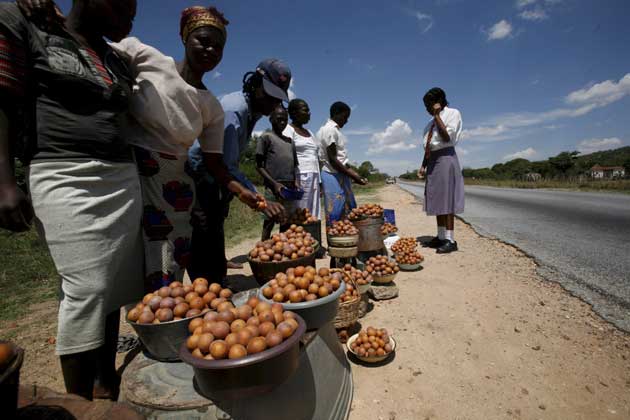UN forced to cut food aid to Zimbabwe's starving people
Half a million will go without emergency handouts this month, and more will be hungry in January. Meanwhile, Gordon Brown says it's time to tell Mugabe 'enough is enough'

Your support helps us to tell the story
From reproductive rights to climate change to Big Tech, The Independent is on the ground when the story is developing. Whether it's investigating the financials of Elon Musk's pro-Trump PAC or producing our latest documentary, 'The A Word', which shines a light on the American women fighting for reproductive rights, we know how important it is to parse out the facts from the messaging.
At such a critical moment in US history, we need reporters on the ground. Your donation allows us to keep sending journalists to speak to both sides of the story.
The Independent is trusted by Americans across the entire political spectrum. And unlike many other quality news outlets, we choose not to lock Americans out of our reporting and analysis with paywalls. We believe quality journalism should be available to everyone, paid for by those who can afford it.
Your support makes all the difference.Half a million people in Zimbabwe will go without food handouts this month, the UN agency responsible for feeding more than two-fifths of the country's population warned yesterday, as shortages of funds force further cuts in rations.
"We are still four months away from the [maize] harvest. We haven't seen the worst yet," Richard Lee, a spokesman for the UN World Food Programme (WFP) in Johannesburg, told The Independent on Sunday. "The situation has worsened more quickly than expected. We have reduced rations in December, and will have to do so again in January."
The food crisis has contributed to the rapid spread of the cholera epidemic now ravaging the country. So far nearly 600 people have died and more than 12,000 have been infected, according to the authorities, but the real figures are believed to be much higher as the disease takes its toll among people weakened by hunger.
The WFP expects 5.1 million Zimbabweans – well over half the nine million people remaining in the country – to need food aid by January. The target for this month was 4.2 million, but rations for only 3.7 million are available. "Rather than excluding entire households from the distribution, we have decided to set a maximum of six rations per household," Mr Lee said. "Families with more than that number of mouths to feed will have to share." In November the monthly ration per person was cut from 12kg of maize meal to 10kg, and from 1.8kg of beans to 1kg.
Drought this year drastically increased Zimbabwe's food deficit. The rains have been good so far this season, but the country's economic collapse means the area planted with grain is well below what is needed to feed the population. The WFP says it needs an extra $100m (£68m) to cover the shortfall up to March 2009.
With millions of Zimbabweans starving and cholera raging, Gordon Brown called on the international community yesterday to tell President Robert Mugabe that "enough is enough", saying: "The whole world is angry because they see avoidable deaths – of children, mothers, and families... This is a humanitarian catastrophe. This is a breakdown in civil society. It is a blood-stained regime that is letting down its own people."
As cholera spills across Zimbabwe's borders into neighbouring countries, Mr Brown said the crisis was an "international rather than a national emergency" that demanded a co-ordinated response. Since there was no administration willing or able to protect the people, Mr Brown said a "command and control structure" should be put in place in the capital, Harare, to manage aid efforts.
Mr Mugabe is not expected to heed Mr Brown's call – if anything, he is likely to use it as proof of his claim that Britain is seeking to recolonise Zimbabwe. The population is constantly told that its problems are due to sanctions imposed by Britain and the US, though in fact these are targeted only at the leadership. But the Mr Brown's strongest statement yet on Zimbabwe echoes growing anger in Africa at the death toll caused by the cholera epidemic and the political and economic breakdown from which it stems.
Desmond Tutu, the Nobel peace laureate, said last week that Mr Mugabe was "destroying a wonderful country" and should be deposed by force if he refused to step down. Kenya's Prime Minister, Raila Odinga, said earlier: "It's time for African governments to take decisive action to push him out of power."
Mr Brown did not explicitly call yesterday for Mr Mugabe to step down, but on Friday the US Secretary of State, Condoleezza Rice, said his departure from office was long overdue: "The fact is there was a sham election; there has been a sham process of power-sharing talks and now we are seeing not only political and economic total devastation... but a humanitarian toll of the cholera epidemic."
Join our commenting forum
Join thought-provoking conversations, follow other Independent readers and see their replies
Comments